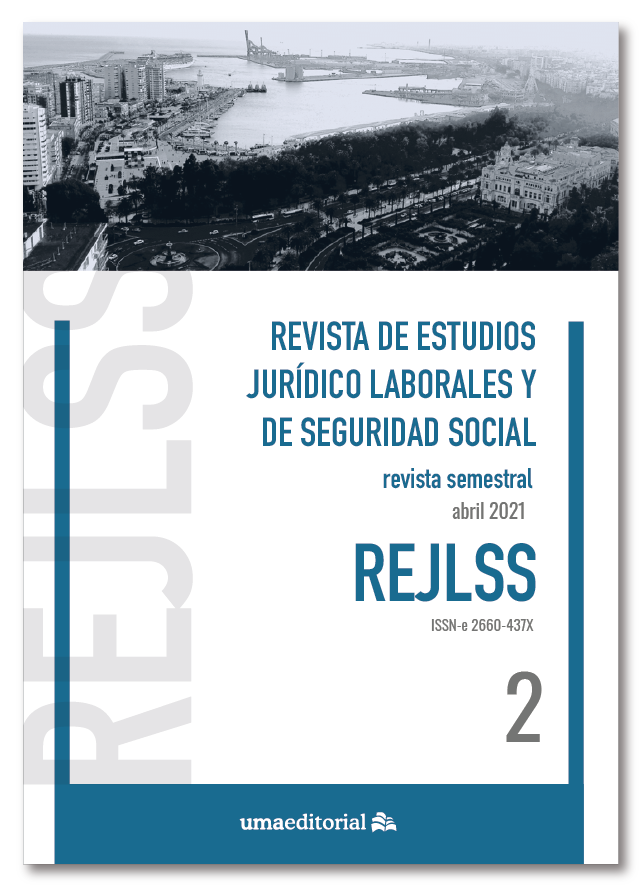New doctrine of the Supreme Court on the assessment of professional experience for the services provided in mutual collaborators with Social Security
Judgment of the contentious-administrative chamber of the Supreme Court of May 26, 2020
DOI:
https://doi.org/10.24310/rejlss.vi2.12452Keywords:
merit, mutual, word, public, concerted, health, ecualityAbstract
Analysis of the recent judgment of the Supreme Court that establishes doctrine about the consideration of mutual collaborators with social security as public health service for the purposes of the evaluation as a merit of the services provided for them in access to public employment. Approach to the complex legal nature of mutuals, the legal regime of their staff, and different judicial pronouncements that have determined the interest of the matter for the establishment of doctrine in cassation.
Downloads
Metrics
Publication Facts
Reviewer profiles N/A
Author statements
Indexed in
-
—
- Academic society
- N/A
- Publisher
- Universidad de Málaga. UMA Editorial
References
García Jimenez, M. “Perspectivas de las Mutuas a la vista de su proyectada Ley”. Revista Española de Derecho del Trabajo. Núm. 162/2014. Ed. Aranzadi, S.A.U.
Garrido Falla, F. “Tratado de Derecho administrativo”. Técnos Madrid. 1989, vol 2, 1.
Lozano Lares, F. “El régimen jurídico de las Mutuas Colaboradoras con la Seguridad Social (I) “Revista de información laboral. Núm. 12/2016. Ed. Aranzadi, S.A.U.
Padros Reig, C y Coello Martín, C. “La extensión del concepto de empleo público a las entidades privadas”. Revista Doctrinal Aranzadi social. Núm. 1/2013. Ed. Aranzadi.
Palomeque López, C. “Encuesta sobre la Seguridad Social Española, Papeles de Economía española nº12/13. Madrid 1982.
Sempere Navarro, A. V. “Régimen jurídico de las Mutuas Patronales”, Madrid: Civitas,1986.
Serrano, J.B. “El acceso al empleo público en régimen laboral tras el estatuto básico del empleado público: Algunas luces y demasiadas sombras”, revista Española de Derecho Administrativo núm. 149/2009. Civitas, 2009.
Downloads
Published
How to Cite
Issue
Section
License
In the Revista de Estudios Juridico Laborales y de Seguridad Social (REJLSS) we are clearly committed to a policy of open access to scientific knowledge (See Berlin Declaration).
Those authors who have publications with this journal accept the following terms:
This journal provides immediate free access to its content under the principle of making research freely available to the public. All the contents published in the REJLSS are subject to the Creative Commons license
Attribution-NonCommercial-NoDerivatives 4.0 International (CC BY-NC-ND 4.0)
Copyrights are of two kinds: moral and patrimonial. Moral rights are perpetual, inalienable, non-transferable, inalienable, unattachable and imprescriptible prerogatives. In accordance with Spanish copyright legislation, the authors who publish in REJLSS retain the moral right over their work, as well as the ownership of the patrimonial right, which will be transferred to the University of Malaga for its dissemination in open access.
The patrimonial rights, refer to the benefits that are obtained by the use or disclosure of the works. REJLSS is published in open access and is exclusively authorized to perform or authorize by any means the use, distribution, dissemination, reproduction, adaptation, translation or transformation of the work.
It is the responsibility of the authors to obtain the necessary permissions of the images that are subject to copyright.
Authors whose contributions are accepted for publication in this journal retain the non-exclusive right to use their contributions for academic, research and educational purposes, including self-archiving or depositing in open access repositories of any kind.
The electronic edition of this magazine is edited by the Editorial of the University of Malaga (UmaEditorial), being necessary to cite the origin in any partial or total reproduction.
The authors may adopt other non-exclusive license agreements for the distribution of the version of the published work (eg: deposit it in an institutional telematic archive or publish it in a monographic volume) provided that the initial publication is indicated in this magazine.
Authors are allowed and recommended to disseminate their work through the Internet (eg, in institutional telematic archives or on their website) before and during the submission process, which can produce interesting exchanges and increase citations of the published work.







19.png)
